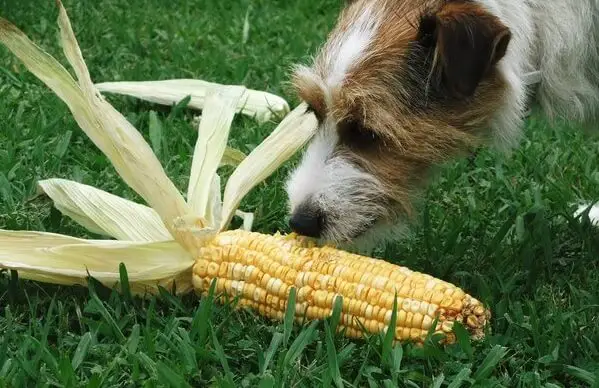Many dog owners like to give their four-legged friends some of what they are currently eating. Corn is very popular in Europe – it is boiled, grilled, or made into popcorn. But are dogs even allowed to eat the yellow grains? Here you find all the important information.
Corn for Dogs in Brief

- Corn is generally not harmful to dogs.
- Since it can cause allergies, dogs shouldn’t consume too much of it.
- Dogs find it difficult to digest the grains – so please puree them!
- It should not come raw from the field, there is a risk of pesticides.
- Because of the many spices, dogs shouldn’t eat corn waffles or chips.
Can Dogs Have Corn? It All Depends on the Amount of Corn.
Opinions are divided when it comes to whether dogs can eat corn. Some strongly advise against giving the fur nose a cob or the grains, others even recommend feeding it. In fact, corn is not unhealthy for dogs.
It contains, among other things:
- Minerals;
- Vitamins;
- Fiber;
- Linoleic acid.
These ingredients are very healthy not only for humans but also for dogs. In addition, some four-legged friends love desserts. For them, the grains are a real treat. However, these are also high in carbohydrates. These are converted into sugar and can make your four-legged friend fat. In addition, the yellow grain is considered to be a trigger for allergies in dogs. So the answer to the question of whether dogs can eat corn is yes, but not too much!
Can Dogs Eat Raw Corn?
People tend not to eat raw grains. But it can happen that the fur nose grabs a piston while walking along a field. In principle, this is not a problem for the dog. The problem with field corn, however, is that it is often sprayed with toxic pesticides. These can be fatal for your four-legged friend. In this regard, cobs from your own garden are harmless, as there are no pesticides there.
What Symptoms Will I See If My Dog Has Eaten Corn With Pesticides?
It happened: your dog ate corn on the cob while walking and it was sprayed. If your darling is poisoned, the following symptoms can occur:
- vomit
- increased salivation
- severe stomach cramps
- worse diarrhea and blood in the stool
- fatigue
- shortness of breath
- symptoms of paralysis can occur
- irregular heartbeat
Can Dogs Eat Popcorn or Sweetcorn?
Popcorn is a no-go for dogs, even if your four-legged friend will probably be happy to beg for a portion when you make yourself comfortable on the sofa during a movie night. Although it is a thoroughly nutritious snack, popcorn usually contains too much salt or sugar, which can negatively affect the dog’s intestinal health. With small dogs, there is even a risk of suffocation with the hard grains. If you prepare the corn into popcorn yourself, avoid salt and sugar. Then your dog can eat in moderation.
Can Dogs Eat Corn Waffles?
People eat the yellow grain in different variants and preparation methods. We grill, cook or turn it into waffles or chips. Some people ask themselves: Are dogs allowed to eat corn waffles or chips? As mentioned above, the grains are not in themselves harmful to dogs. But if they are processed into snacks, they are usually heavily seasoned. These spices are rather bad for the dog and can cause stomach upset. So it is better not to give your darling sweets or snacks made from corn.
What is the Best Way to Prepare Corn for My Dog?
To make the corn kernels digestible, it is best to puree them before they are fed to the four-legged friend. You can also use corn flakes or cornflour, which the dog’s organism can break down and digest.
My Dog Ate Raw Corn From the Field – What Should I Do?
- First, observe your dog and watch out for any symptoms of poisoning.
- If the dog shows the above symptoms, contact a veterinarian immediately.
- If he shows no symptoms, wait and see. Your fur nose will probably excrete the grains undigested.

